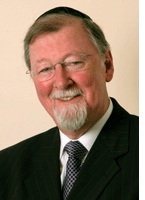It is with great sadness that we announce the death of our Rabbi Emeritus Rodney Mariner, on the night of 15-16 August 2024.
Having been spiritual leader of Belsize Square Synagogue for 29 years, Rabbi Rodney Mariner was the longest serving rabbi in the congregation’s history. During his term of office from March 1982 to May 2011 he had been party to many fundamental changes, but his acute understanding of the unique heritage of the synagogue meant that the distinct ethos of the community was maintained throughout. This understanding was a result of having attended a synagogue in his native Melbourne with the same Liberale liturgy and similar membership. He became enamoured with the music, the people and the evocative rabbinical sermons.
When Rabbi Mariner took up office, he brought with him congeniality and humour which was far cry from the more formal and remote style of his two predecessors. However, just like them, he delivered stimulating and thought provoking sermons, but each of them was usually accompanied by a joke relevant to the sermon’s theme, something that previously had not been delivered from the bima. It took some of the older members a little by surprise, but they soon adjusted to the style of their new personable Rabbi.
Rodney, as he preferred to be known, arrived at a difficult time. Membership was falling dramatically, the average age was over 50 and the number of children at Cheder was alarmingly small. He brought new life, a breath of fresh air, to the community and in a relatively short time his growing reputation attracted many young families to Belsize Square and through them the Sunday classes very rapidly expanded to over 100 children. His aim was always to rebuild the community through the children. And he did precisely that.
He worked harmoniously together with six different chairmen. At first, under the chairmanship of Ernst Nathan, he very surprisingly had to introduce kashrut to the synagogue’s kitchens, also the introduction of Sephardi pronunciation to all services. The very big change came when together with Chairman Harry Davies he saw through secession of the synagogue from ULPS to become an entirely independent congregation.
Rodney was born in Melbourne, Australia in 1941. He left school at 15 and for seven years worked in engineering as a draftsman, eventually giving up that role to take up a place at Monash University in Melbourne. There he was able satisfy his innate thirst for knowledge and further education and graduated five years later with a BA Hons in English Literature and European History. Following three years teaching English at a secondary school he was granted a five-year scholarship which enabled him to take up studies for the rabbinate. Those studies started at the Hebrew Union College and School of Biblical Archaeology in Jerusalem and were concluded at the Leo Baeck College in London in 1976 when he was granted his semichah.
Thereafter, he served at North Western, Alyth Gardens and Edgware & District Reform Synagogues. After a short sabbatical in 1996, which he devoted to Holocaust studies working at Jewish Care, he set up the Holocaust Survivor Centre in Hendon. Other work for the wider community included serving for 22 years as the Convenor of the Rabbinical Court of the Movement for Reform Judaism.
Together with his wife Sue, he edited and translated (and as Rabbi Emeritus, digitally reformatted) the synagogue’s own prayer books for Shabbat, the High Holidays and the Festivals. They also arranged and led youth trips abroad and most notable, an emotional and poignant adult visit to Berlin in May 2002. Apart from liturgical advances, Rodney’s footprint can also be seen in the building itself – the bima, the Ark, the sanctuary itself – he was involved in all of it. His many achievements over his long calling at Belsize Square Synagogue are too numerous to recall here. His legacy is undoubtedly the vibrant community which exists today.
In his own words around the time of 60th anniversary: “The synagogue became my family too. It is everything. It houses my collegial group. It is my place for laughing and weeping. It stimulates my ideas. Other than some pals back in Australia, my entire circle of friends come from or are associated with this congregation.”


